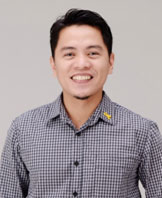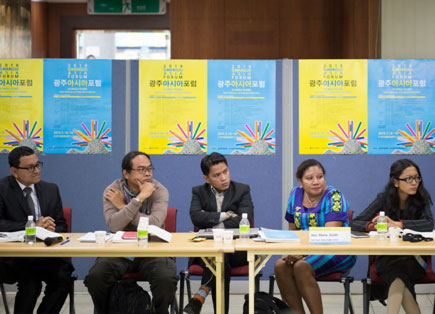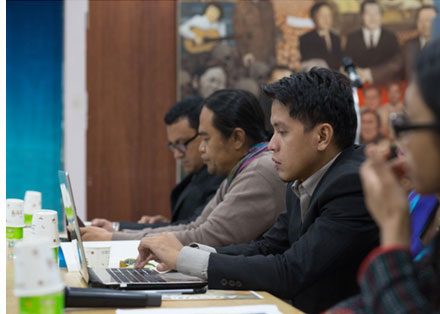Last May 16-18, 2016, The May 18 Memorial Foundation hosted a successful annual event, the Gwangju Asia Forum under the theme of “State Violence and Historical Distortion.” Here are some of the valuable voices from the participants.
Reaffirming our commitment to the promotion of Human Rights and Democracy in Asia: My Gwangju Asia Forum 2016 Experience
John Alster Soriano
Program Officer, Medical Action Group, Inc. (MAG), Philippines

John Alster Soriano
The gathering was initiated by the May 18 Memorial Foundation to give recognition to the efforts of the human rights and democracy movers in Asia. This year, the forum launched various sessions on Solidarity for Social Justice (SFSJ), Solidarity, Solidarity for Democratization Movement in Asia (SDMA), Donors and Grassroots Support.
Series of exhibit displayed the May 18 Great Solidarity wherein countries like Germany, the United States, and Japan archived different articles and materials during the democratic uprising and shared them with the foundation. The forum, also invited the participant to bring their stones from their respective countries to be offered to the memorial of the late Jürgen Hindzpeter, a German journalist who witnessed the atrocities and violence of the May 18 Democratic Uprising and published them.
The overall atmosphere of the event was both melancholic and festive as the participants showed support to the wife of Hindzpeter and her family. The Jürgen Hindzpeter Memorial was formally opened to public on 17 May 2016 with the members of the parliament and the local government of Gwangju and the local and international human rights defenders and democracy movers.
My Lessons and Reflections
I was invited by the May 18 Memorial Foundation as one of the nine (9) speakers in the SFSJ session where I was encouraged to share the human rights, democracy, and the criminal justice system in my country. This was my second time to visit Korea. As an alumnus of the May 18 Academy back in September 2015, I had the opportunity to further expand my network, learn and exchange information between and among colleagues from the MAINS Program of the Sungkonghoe University and from the different civil society organizations in Asia.The session was facilitated by Professor YiombiThona, the Deputy Chairman at Asia Pacific Refugee Rights Network and a long-time professor at Gwangju University. He is a human rights defender promoting and protecting the rights of the migrants and refugees. And I must say that I was inspired by his admirable work and his dedication for the protection of refugees and how he continues to share stories particularly his own experience when he first set foot in Korea – an alien, a foreigner.
The SFSJ session was headed by the Executive Director of the Asian Human Rights Commission (AHRC), Mr. Bijo Francis and he highlighted the importance of the guaranteed human rights of all individuals whether you are in or you are out of your country. He gave specific examples on how such rights are protected in Hongkong as compared to his home country, India. He then urged everyone to be vigilant and stand against discrimination and non-guarantee of the civil and political rights (CPR) as well as the economic, social, and cultural rights (ESCR). I was inspired by his experience in Hongkong as an Indian, a foreigner living in a foreign land but guaranteed full human rights. I was inspired by his dedication to work not just for his rights, but for the rights of his fellow Asians. The AHRCis an organization working in 10 countries for the promotion, protection and respect for human rights. MAG, my organization, along with other Philippine organizations have had partnership with AHRC in mainstreaming issues in the country.
A special lecture by East Timor first President Xanana Gusmao highlighted the value of the peoples’ struggle to fight for freedom against oppression and repressive government. As a freedom and justice advocate, he was involved in various activities that led to the liberation of East Timor in 2002. Since then, he has been serving the government, currently as the Minister for Planning and Strategic Investment. The strength and inspiration could be drawn from the hard work and patience of Xanana and other human rights defenders. The collective effort and the shared vision of peace and democracy keep the hearts and minds of the new generation of human rights defenders like me. The old stories, the democracy and freedom which the May 18 taught us will remain strong and alive within us. The spirit of the May 18 lives and continues to remind us that the dark days of the past should never happen again.
Parallel sessions on Social Justice and Rehabilitation for Survivors of State Violence (SJRSSV), SDMA and Grassroots Support provided more information on the various challenges the organizations are facing in relation to human rights, justice, peace, and democracy. A series of presentations and plenary sessions was facilitated by the May 18 Memorial Foundation. The aforementioned sessions created an environment for strong solidarity and support. I have attended an SDMA session on the 2nd day as well as the SJRSSV where I learned about the grievance of the families of the victims of the Sewol Ferry, the May 18 mothers and grandmothers and other survivors, and the rehabilitation of the victims of human rights violations.
In commemoration of the May 18 Democratic Uprising in Gwangju, the participants of the forum collectively marched in solidarity with the people of Gwangju from the town square to Geumnamno road where the government launched a program to recognize and to remember the spirit of the May 18 movement.
I also took part, together with my colleagues, in the 36th Commemoration of the May 18 Democratic Uprising on May 18, 2016. We went to the May 18 Memorial Cemetery to witness a short program in remembering the movement 36 years ago. We waived Korean flags in solidarity as we marched and sang the “March for the Beloved,” the May 18 song which was also enfolded with some controversies from the parliament opposition. As an advocate coming from a country where dictatorship was also endured for over two decades, I felt that the spirit since 1980 is still felt until now. I have deepest admiration for the Gwangju government for the overwhelming support for the May 18 Memorial Foundation since 1994. This is one of a kind – for the government to support and take action against the atrocities of its predecessors. Although, public apology has yet to be given to the May 18 victims and survivors, the strong support of Gwangju government makes the spirit of the May 18 alive.
The May 18 Memorial Foundation has a vast collection ranging from the notes, clothing, letters, ammunitions, guns, songs, photos, videos, and materials related to the movement. The participants and guests of the forum were able to witness the display of such documents which captured their hearts and earned respect to the unsung heroes of the democratic uprising in Gwangju, 36 years ago.
I came to realize the great privilege I received from the generous support of the May 18 Memorial Foundation. This opportunity did not just let me learn from the democratic uprising of Gwangju, but an exploration of Korea as a nation, as a culture, and as a society. My first visit in Gwangju expanded my network linkages as I was able to meet and exchange opinions and information with my colleagues from Asia and Africa. I have been working with my NGO for over six years now and it continuously provides more learning through local and international conferences such as this. Through the May 18 Foundation, I was able to understand and see a much larger context of human rights, peace, justice, and democracy. The two-week May 18 Academy let me explore the arts and culture of Gwangju and nearby districts, the scientific and modern Korean technology, and the Asian hospitality and friendship that all of us really enjoyed and treasured. The May 18 Academy schedule was tight in terms of series of lectures on the situation of human rights and democracy from the resource persons but at the same time, a wonderful fellowship between and among human rights defenders in Asia.
The Gwangju Asia Forum, on the other hand, was inclined into a larger audience, with a larger perspective on the trends on democracy in Asia and how the human rights defenders cope with challenges in and out of their countries. The forum deepened my knowledge and appreciation on the different human rights situation within Asia and the plight of the people who stand against repression and violation of our human rights.
These two activities enhanced my capacities as a human rights defender. I have developed my knowledge on human rights, democracy, justice and peace in the local and in the regional context. The camaraderie and solidarity among colleagues are strong and unwavering. My commitment to respect, protect, and fulfill human rights has been intensified and reaffirmed as I goback to my country and share this not only with my NGO colleagues, but with my friends and acquaintances who value human rights and democracy as the core of human dignity.
May the spirit of the May 18 Democratic Uprising live! May the stories inspire us and bring us back to where the uprising started – quest for just and lasting peace.




